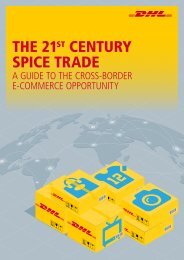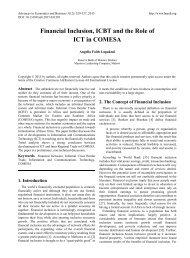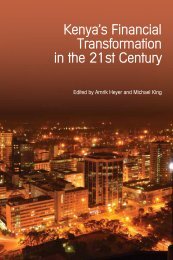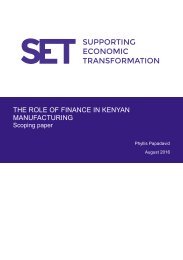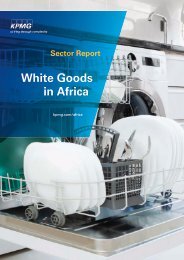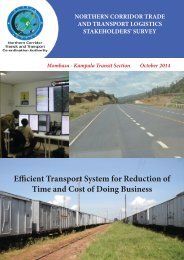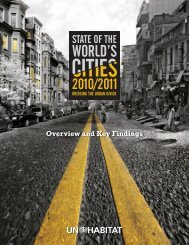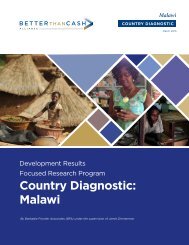FD
gvti301SEaf
gvti301SEaf
Create successful ePaper yourself
Turn your PDF publications into a flip-book with our unique Google optimized e-Paper software.
deposit base. Some 11 Kenyan banks now have more than<br />
300 branch outlets in east Africa (including South Sudan).<br />
At the same time, contrary to common belief, increased<br />
financial access has led to improved quality of bank assets<br />
when accompanied by better financial oversight. The<br />
Financial inclusion opens the door<br />
for potentially game-changing<br />
opportunities.<br />
recent drop in the share of nonperforming loans in total<br />
loans reflects mainly better credit appraisal—thanks to<br />
measures such as the 2010 Credit Information Sharing<br />
regulation, which helped reduce the disparity in information<br />
between lenders and prospective small-scale borrowers<br />
(see Chart 3).<br />
Welfare gains<br />
Kenya is a good example of the potential benefits of financial<br />
inclusion. Based on a model by IMF economists Dabla-Norris<br />
and others (2015), we estimated the reduction in transaction<br />
costs and the impact on Kenya’s growth from financial inclusion.<br />
First, it generates additional funds channelled to entrepreneurs.<br />
Second, lower transaction costs help improve the<br />
efficiency of contracts. Finally, more efficient allocation of<br />
funds in the financial system allows talented people without<br />
resources to become entrepreneurs.<br />
All these channels are expected to be significant in Kenya<br />
given that country’s substantial increase in access to credit<br />
by small and medium-sized enterprises—from 25 percent to<br />
33 percent between 2006 and 2013 (World Bank Enterprise<br />
Surveys). Our preliminary results show a reduction in transaction<br />
costs of 65 percent during 2006–13, with an annual<br />
contribution to GDP growth of about 0.45 percentage point<br />
(Morales and others, forthcoming).<br />
This boost to credit access took place even though<br />
it was partly offset by the rollout of stronger financial<br />
regulations, which raised monitoring costs and collateral<br />
requirements. This implies that financial inclusion<br />
through adequate policies could complement efforts to<br />
strengthen the financial regulatory framework, by helping<br />
banks expand their lending base while enhancing their<br />
soundness. The dramatic reduction in transaction costs<br />
spurred by digital financial services has clearly played a<br />
key role in this achievement.<br />
Digital financial services not only contribute to financial<br />
development, they also support financial stability. With less<br />
need for cash for transactions, more economic agents can<br />
send and follow financial market signals, contributing to a<br />
more solid and vibrant financial system. The environment<br />
for monetary policy improves as a result.<br />
In addition to these benefits, there are other reasons why<br />
proactive policies enhance financial inclusion:<br />
• Achieving inclusive growth without fast progress in<br />
financial inclusion in low-income countries is very difficult.<br />
According to World Bank Enterprise Surveys, in most<br />
African countries, small and medium-sized enterprises still<br />
report lack of access to financial services as their main obstacle<br />
to conducting business. These enterprises are a key sector<br />
of the economy because of their potential for employment<br />
generation and reduction of the informal sector.<br />
• For low-income countries with some degree of financial<br />
intermediation, there is a clear correlation between financial<br />
inclusion and human development (IMF, 2014), which points<br />
to a need to improve the regulatory technology.<br />
• Successful financial inclusion discourages policies that<br />
constrain market development. In several African countries<br />
initiatives still focus on specialized institutions, such as development<br />
banks or other institutions that lend to particular<br />
sectors—in agriculture or to small and medium-sized businesses—or<br />
on initiatives to introduce interest rate controls,<br />
despite overwhelming evidence against their effectiveness. As<br />
more and more citizens benefit from financial inclusion, the<br />
case for inappropriate measures will weaken.<br />
In addition to lowering the costs of transactions, financial<br />
inclusion opens the door for potentially game-changing<br />
opportunities: innovative pension plan support and government-targeted<br />
social protection, expansion of regional<br />
payment systems within regional blocks, enforcement of<br />
policies to stop money laundering and the financing of<br />
terrorism, and a better environment for forward-looking<br />
monetary policy to replace years of financial repression and<br />
reactive policies. ■<br />
Njuguna Ndung’u is an associate professor of economics at<br />
the University of Nairobi and was previously Governor of<br />
the Central Bank of Kenya. Lydia Ndirangu is the Head of<br />
the Research Centre at the Kenya School of Monetary Studies.<br />
Armando Morales is the IMF Resident Representative<br />
in Kenya.<br />
References:<br />
Dabla-Norris, Era, Yan Ji, Robert Townsend, and D. Filiz Unsal, 2015,<br />
“Identifying Constraints to Financial Inclusion and Their Impact on GDP<br />
and Inequality: A Structural Framework for Policy,” IMF Working Paper<br />
15/22 (Washington: International Monetary Fund).<br />
FinScope Surveys, various issues (Midrand, South Africa: FinMark<br />
Trust).<br />
International Monetary Fund (IMF), 2014, Regional Economic<br />
Outlook: Sub-Saharan Africa—Fostering Durable and Inclusive Growth<br />
(Washington, April).<br />
Kimenyi, Mwangi S., and Njuguna S. Ndung’u, 2009, “Expanding<br />
the Financial Services Frontier: Lessons from Mobile Phone Banking in<br />
Kenya” (Washington: Brookings Institution).<br />
Klein, Michael, and Colin Mayer, 2012, “Mobile Banking and Financial<br />
Inclusion: The Regulatory Lessons,” World Bank Policy Research Working<br />
Paper 5664 (Washington).<br />
Morales, Armando, Lydia Ndirangu, Njuguna Ndung’u, and Fan Yang,<br />
forthcoming, “Measuring the Impact of Financial Inclusion in Kenya,” IMF<br />
Working Paper (Washington: International Monetary Fund).<br />
World Bank Enterprise Surveys, various issues.<br />
Finance & Development June 2016 17



